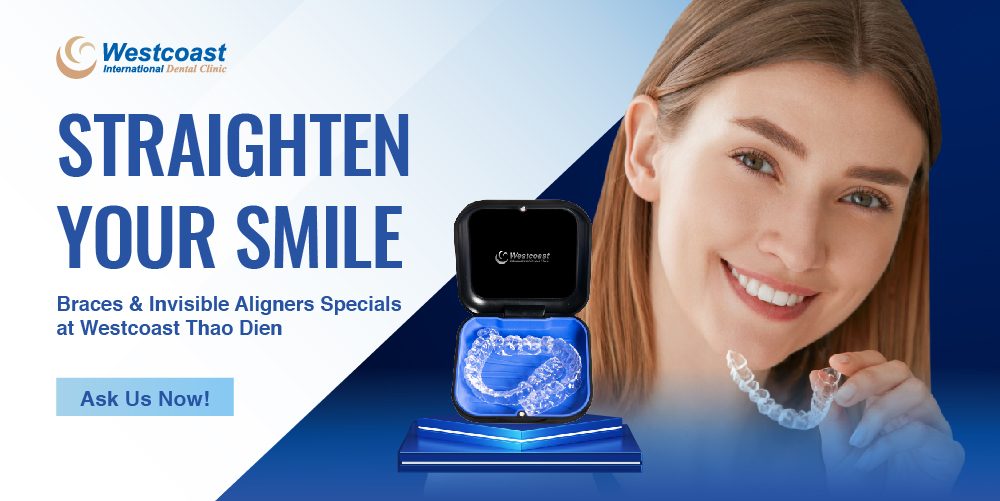FAQ
Contact Us if You Have More Questions
How much time will I need to schedule for my dental work?
The timing for dental treatments varies. Tooth Whitening, for example, can be done in an hour. Implants may require 1 week and potential follow-up procedures. It will also depend on your dental health and the severity of your case. Our doctors can give you a good estimate as soon as they have access to your scans, x rays and your requests.
Will I really save a lot of money with dental work done in Vietnam?
If you are already here then yes, you would. How much depends on the amount of treatment that you require. If you happen to be planning to come to Vietnam for a holiday and drop in for teeth whitening, then you may end up saving several hundred dollars. The best savings come to those who need a lot of dental work done. We offer fees that are on average 1/3 less then those in Canada, Australia and the US. In some cases even less. The amount saved will depend on the type of procedure as well as the cost of a plane ticket and hotel fees. Contact us and we will give you a good approximation of the costs involved. If you are on a thrifty travel budget we can make recommendations to help you economize further adding to your savings.
How can I be sure that your dentists and hygiene staff are highly trained and competent? Do your dentists speak English?
We are committed to keeping up to date with the latest techniques and materials in dentistry. Our staff is highly trained in all aspects of dental care. We are digitally linked with overseas partners and we focus strongly on continuing education and consultation with leading specialists. On top of our full time staff we have a rotation of foreign doctors that participate at our clinic. Our professional team is committed to being the leader in training and education in dentistry in Vietnam. Our dentists speak English well. We have a full time Expatriate Managing Director and Dentists with overseas education and experience. We pride ourselves on delivering the same high quality standards as available in the best clinics in western countries.
Can I feel confident about your hygiene services?
Dental hygienists do not exist in every country but are part of the growing trend in dentistry around the world because of their specialized services. Our hygienists have 3 years of dental school training and over 5 years of practical experience. They take the time to provide you with thorough cleanings and home care advice. You can expect a comparative level of service or better then what is available in the USA, Canada and other Western countries. We aim to provide a gentle experience with our dental hygiene services.
Do you accept insurance?
We are committed to making sure that you understand your insurance benefits. We are familiar with both traveler's and general health insurance policies. Some insurance policies we work with include Bupa, MetLife, Cigna, IMS, AON, Bao Viet, SunLife and GoodHealth. We have Direct Billing relationships with many companies including Cigna, Euroinsurance and IMS.
Why are your fees higher than many local clinics?
Our aim is to offer the best in dental service and quality without compromise. We do not use cost cutting measures by using inferior dental materials or equipment and cheaper, ineffective sterilization. As a leader, we commit more resources to the training and development of our team members. We employ only the best dentists and medical professionals. High quality dental treatment is an investment in good, long lasting oral health. We're not interested in cutting corners. We could be compared with top dental clinics such as Orchard Road in Singapore or Central in Hong Kong, however our services are offered at 1/3 the costs. Our fees are significantly lower than many parts of Europe, Australia, Canada and the USA, especially for complex treatments involving cosmetic dentistry and dental implants.
What about guarantees?
Firstly we fully Guarantee all the Dental Procedures we complete. If for any reason you are not satisfied, are concerned or have questions we will follow up promptly.
We are committed to creating positive results with regards to your dental work. Rarely, does a dental clinic have a written policy or offer a guarantee on it’s work. We do it because we believe you are making the choice of a reputable clinic that will guarantee it's work. We want you to feel our treatment is worth what you are investing. Our initial treatment plan is aiming for a long term cure of past dental problems. We actually don't want you cycling in and out of our clinic for repetitive dental care by making an incorrect treatment decision. We believe that we're successful if you finish treatment with us and don't require much more for the rest of your lifetime.
How safe is your infection control?
We follow the strictest infection control guidelines from the Center of Disease Control (USA), Canadian Dental Association, Australian Dental Association and American Dental Association. Our strict protocol for disposables and cleaning is what you will notice at Westcoast International. For more info click here
How about the training of your dentists?
Our dentists are accredited with our internal program which assesses communication and competency in various areas in dentistry. All are more than able to perform general dentistry techniques at levels equal to (and often beyond) levels measured in Western Board examinations. The language and communication skills of our dentists are at a level ensuring, effective and competent communication with foreign and local patients.
How do your dentists keep up with the latest technologies?
We as a group are fully committed to learning. Dentistry has already developed into a modern science and we keep on top with regular lectures and international meetings in Vietnam and abroad. Further, the cooperation of local and foreign doctors working alongside one another has made a significant impact in stimulating professional engagement and passion for our profession.
Where are your doctors trained?
Our doctors are trained in various countries. We have doctors that have graduated from Canada, France, Australia and Vietnam. Importantly, as you are probably aware, there are good and bad doctors in every country. What sets Westcoast International ahead is that dentists joining our practice are evaluated on different levels. The first is clinical practice, which is the ability to perform excellent dentistry. The entire team is continually assessed to guarantee their ability to treat patients with excellent care. The second is communication skills and the understanding of complex and challenging diagnosis. The third is empathy and ethics. We will not allow our dentists to over treat patients or prioritize their own financial interests. Fair honest dentistry is part of our mission at Westcoast.
FAQ Patient Services
Is cosmetic dentistry only referring to teeth whitening?
Cosmetic dentistry can be used for many purposes such as gaps between teeth, cracks or cavities, broken or crooked teeth, stained or discoloured teeth, uneven teeth, and chips or rough spots. Teeth whitening is just one part of cosmetic dentistry which also includes veneers, implants, crowns, orthodontics, shaping, etc.
Is teeth whitening for everyone?
Generally, teeth whitening systems work great for everybody. Some people do experience mild sensitivity during the treatment but this goes away after the treatment is completed. There are some cases of staining due to fluoride or antibiotics that require careful pre-examination to ensure that the results will be good. The safety and effectiveness of these systems is backed by clinical research and is endorsed by all dental associations. Like any dental interventions, teeth whitening is also not recommended for pregnant or lactating mothers.
If my tooth is white, does that means it is healthy?
This is a myth. A tooth can look good and white but can contain cavities or other problems that require some form of treatment. If ignored, these hidden problems can lead to more serious, painful and unattractive problems. We recommend 6-12 month check ups regardless of how your teeth appear.
Can we receive teeth whitening if we have crowns and fillings?
Crowns and fillings do not whiten with teeth bleaching. If you have odd color crowns, crowns with dark lines near the gum-line, or old fillings that stand out, you may want to consider bleaching prior to replacement to enhance the look of your smile.
Are implants an emergency procedure?
Dental implants are used to fill empty spaces in the mouth caused by missing teeth. It can be used for aesthetics, comfort and also to prevent many problems including decay, periodontal disease, stress on the remaining teeth, etc. Implants are titanium screws surgically placed in the bone of the mouth to which a tooth, bridge or a denture can attach to make a stable restoration.
Are Implants only for young adults?
No! Implants are possible for everyone as long as you have enough bone in the area of the missing tooth to facilitate the anchorage of the implants. If you are missing one tooth or all your teeth, implants may be for you. If you don’t have enough bone, a graft may be necessary.
Does implant surgery involve a lot of pain?
No! Most people experience mild to moderate discomfort following dental implant placement. In more rare cases there are cases of moderate severe discomfort lasting a few days. Most describe the implant as less painful afterward than having a tooth extracted. The procedure can be done under local anesthesia. During the procedure there should be NO discomfort.
Is dental implant expensive?
It is true that it is a costly procedure. In the United States and Canada, this operation is between $3000 and $5000. In our clinic, this intervention is between $1800 and $2500. You may also consider the placement of implants as a long-term investment.
If I need a bone graft, where does it come from? Is it safe?
We have several areas where a bone graft can come from. The first is your own bone such as from jaw or hip. Another choices are from FDA approved used bone graft material that are made from human free dried bone, animal source (cow) or synthetic (calcium triphosphate). With all choices, the safety is guaranteed and been CE and/or FDA approved for use. All the choices have shown to be extremely safe and well documented in the literature for use.
Is it true that thumb sucking by children lead to teeth disorder?
It is true that if the child continues this habit after the age of 3 to 5 years old, it can result in forward placement of upper teeth. In this case, the intervention of a dental surgeon may be required.
Are braces only for teenagers?
This is a myth! Although many people associate orthodontic treatment with adolescence, orthodontists can spot subtle problems with jaw and tooth growth much earlier, while the primary or baby teeth are still present. Some of the more readily apparent conditions that indicate the need for early examination include:
- early or late loss of teeth
- difficulty in chewing or biting
- mouth breathing
- thumb sucking
- crowding, misplaced or blocked-out teeth
- speech difficulties
- biting the cheek or the roof of the mouth
- teeth that meet abnormally, or don't meet at all
- facial imbalance
- jaws that are too far forward or back
Kids as young as four (4) are sometimes advised to start Orthodontics in order to avoid a more severe problem later on. Orthodontic treatment is most common between the ages of 8 and 14. At this age, we can take advantage of natural bone growth to influence changes in a positive direction.
Orthodontics and braces can be effective at any age. However, as you get older the treatment may take longer. Your bones grow much faster when you are young so your jaw is easy to stretch. By the time you are 20, you may need surgery to expand your jaw. Usually, braces take from 12 to 30 months. This will depend on the severity of your case. Consult a specialist to receive an estimation of time and costs.
Do people wearing braces have food restrictions?
For the most part people can eat normally. They should avoid hard, sticky, gooey or crunchy foods. Caramel and taffy can stick to braces and if not properly removed can cause cavities. Crunchy foods like apples and carrots should be cut into smaller pieces before eating.





